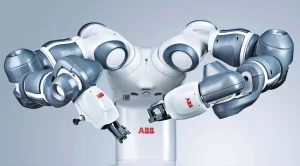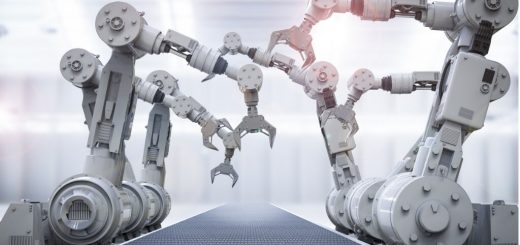Abb robot features, advantages, disadvantages and What can ABB robots do?
ABB robots are widely used in industrial applications due to their advanced technology, versatility, and reliability. ABB robots are engineered to handle repetitive, hazardous, or precise tasks, improving productivity, safety, and efficiency across various industries.
Abb robot
ABB robots are designed for versatility and can perform many tasks across various industries. ABB offers robots of various payload capacities and reaches, catering to diverse industries. Collaborative models (like YuMi) include advanced safety systems, allowing humans and robots to work side by side. ABB focuses on energy-efficient designs, reducing power consumption without compromising performance.
Features of ABB Robots
ABB robots are known for their accuracy and high-speed operations, They are ideal for repetitive tasks. ABB robots can handle many applications, including welding, painting, material handling, assembly, and inspection. ABB’s RobotStudio allows simulation, programming, and optimization of robotic applications offline, reducing downtime.
ABB robots can be integrated with digital solutions, enabling real-time monitoring and predictive maintenance through IoT platforms. Programming interfaces like RAPID make ABB robots user-friendly and adaptable to new tasks. ABB robots are built to last, with a strong emphasis on operating in harsh industrial environments.
What can ABB robots do?
Core Capabilities
- Material Handling: ABB robots are used in pick-and-place operations, sorting and transferring items, palletizing and depalletizing.
- Welding: ABB robots are used in arc welding, spot welding, and laser welding.
- Assembly: ABB robots are used for precise and rapid assembly of components, electronics assembly (e.g., circuit boards), and automotive part assembly.
- Painting and Coating: ABB robots are used for uniform and high-quality spray painting, powder coating, and surface treatment.
- Inspection and Quality Control: ABB robots are used for vision-based defect detection, dimensional inspections, and high-speed sorting for quality assurance.
- Packaging: ABB robots are used for Food packaging in sanitized environments, Box packing and product wrapping, Bottle capping, and sealing.
- Pick-and-Place Operations: ABB robots are used for high-speed picking of items from conveyors, and arranging products in predefined patterns.
- Machining and Cutting: ABB robots are used for CNC machining support, Laser and waterjet cutting, Polishing, and deburring.
- Logistics and Warehousing: ABB robots are used for automated material storage and retrieval, Sorting, and organizing inventory.
- Collaborative Tasks (Cobots): ABB robots are used to collaborate safely with human workers (e.g., ABB YuMi) and assist in complex and delicate tasks.
Industry-Specific Applications
- Automotive: ABB robots are used for welding car bodies, assembling automotive components, painting and surface finishing.
- Electronics: ABB robots are used to handling delicate electronic parts, and assemble smartphones, tablets, and other gadgets.
- Food and Beverage: ABB robots are used to package, label, and sort, handle raw materials, and finish products.
- Healthcare and Pharmaceuticals: ABB robots are used for drug dispensing and packaging and lab automation (e.g., sample testing and preparation).
- Construction: ABB robots are used for Prefabricated component assembly, Bricklaying and material handling.
- Aerospace: ABB robots are used for composite material manufacturing, drilling and riveting,
- Renewable Energy: ABB robots are used to Assemble solar panels and wind turbines and inspect and maintain renewable energy systems.
Advanced Capabilities
- Artificial Intelligence Integration: Smart decision-making for adaptive tasks.
- IoT and Cloud Connectivity: Remote monitoring and predictive maintenance.
- Precision and Micro-Tasks: Handling tasks requiring micrometer-level accuracy.
- High Payload Handling: Managing heavy loads (e.g., construction equipment or machinery parts).
Advantages of ABB Robots
Abb robots can improve productivity, Enhanced speed, precision, and uptime lead to increased throughput. Abb robots can reduce labor costs, Automation reduces reliance on manual labor for repetitive or hazardous tasks. Advanced safety features and ergonomic designs protect workers from hazardous tasks.
Abb robots can enhance the quality, Consistent performance ensures high product quality and reduced errors. ABB robots can be reprogrammed or adapted for new tasks, making them suitable for changing production needs. ABB provides extensive customer support and services worldwide.
Disadvantages of ABB Robots
High Initial Investment of ABB robots, The upfront cost of ABB robots, including setup and integration, can be significant. While durable, ABB robots require skilled personnel for maintenance and troubleshooting. Despite user-friendly programming, new users may require training to utilize ABB robots effectively.
ABB robots depend heavily on stable power supplies and network connectivity, which can be a challenge in some regions. While adaptable, certain highly customized tasks may require specialized or non-standard solutions. If a robot fails, it can halt production until repaired, emphasizing the need for backup systems and maintenance planning.
Applications of ABB Robots
- Automotive Industry: Welding, assembly, and painting.
- Electronics: Handling delicate components and precise assembly.
- Pharmaceuticals: Packaging, inspection, and material handling.
- Food & Beverage: Pick-and-place operations and packaging.
- Construction: Heavy material handling and component assembly.
You can subscribe to Science Online on YouTube from this link: Science Online
You can download Science Online application on Google Play from this link: Science Online Apps on Google Play
Scara robot advantages and disadvantages and What is the structure of the SCARA robot?
Serial Robots review, advantages, disadvantages and what can serial robots do?
Collaborative robot arm (cobot robots) applications, uses, advantages and disadvantages
Automation in manufacturing uses, advantages and disadvantages
Industrial robot (Auto industry) uses, advantages and disadvantages
Robot welding advantages over manual welding
The advantages and disadvantages of robots in factories
Advantages and disadvantages of using robots in our life
Yumi Collaborative Robot features, uses, types, and advantages
Automation in manufacturing uses, advantages and disadvantages




